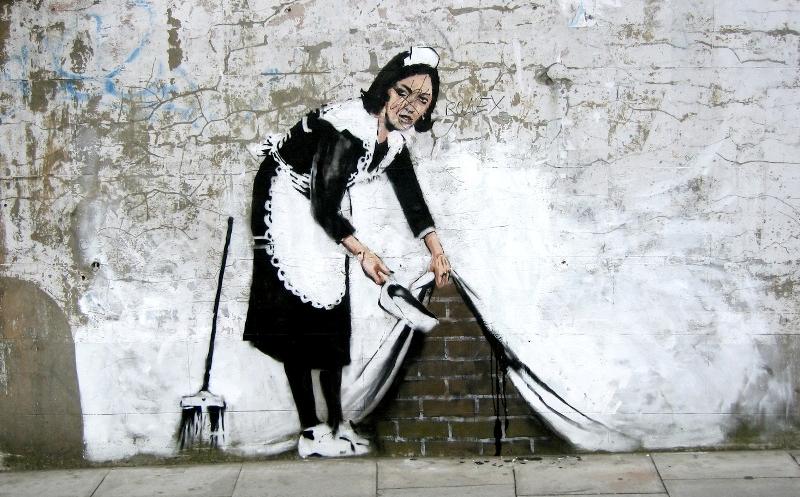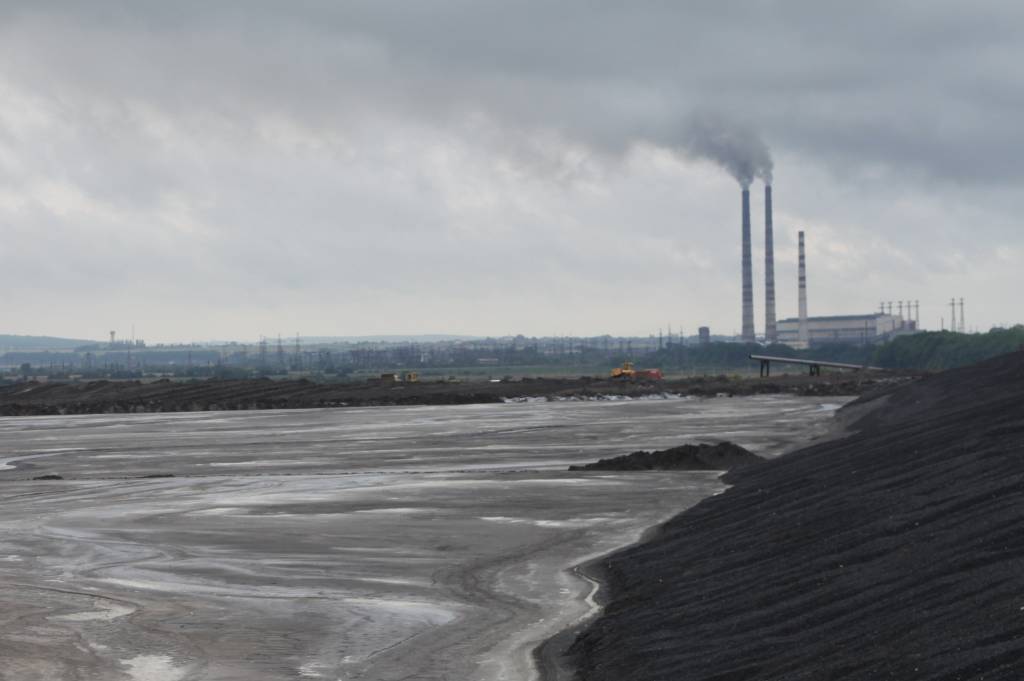Oleg Savistky, climate and energy activist from Ukraine on why Europeans’ call for divestment should include divesting from state-subsidized Ukrainian energy, in a guest post. “What is needed now is external pressure from European public, calling for seizure of electricity imports from Ukraine and halting investments into Ukrainian coal industry”.
Let’s suppose you have a problem – you have some dirt in your room (which scientists consider toxic) and you need to clean it. You don’t really care about science, but mom tells you to do so, or otherwise you’ll be punished. And at the moment you don’t have a high-tech vacuum cleaner, only an ordinary broom.
Getting the dirt out from the floor to the trash bin requires a considerable effort, and this often drives to an easy way to handle this situation. With precise maneuvers you gather the dirt in one place near the carpet, and then you lift the margin of the carpet and push the dirt underneath the carpet. Now the room looks clean, but it isn’t. The dirt is still in the room, so does its toxic effect.
Such behavioral pattern is typical for humans in many contexts, when people pretend to solve a problem by addressing the wrong issue. Debate is over and scientists urge us to fix carbon pollution as fast as possible. But we don’t have a mom who could show some good parenting and not punish us too hard for creating the mess and not cleaning it. Instead we have atmospheric physics and laws of nature, and we shouldn’t expect mercy from them.

We had more than 20 years to start cleaning up. Actually some countries did a little effort on that, but on a global scale we are still adding much more mess to the atmosphere than we are capable to “hide under the carpet”, and we don’t have a “vacuum cleaner” too. We cannot count on CCS neither as a “broom”, nor as a real solution, because the problem of carbon pollution can’t be fixed systematically by just pushing it underground. With fossil fuels (which are vast, but still limited resources) and CCS we still will have an open loop system, which is incompatible with long-term environmental sustainability. Moreover, locking in the capital in fossil fuel technologies (including CCS) can add to a serious economic threat: stranded assets and “carbon bubble”.
It is estimated that multinational energy companies hold $7 trillion in carbon assets on their books. This problem was clearly stated by Al Gore last year: “The valuation of those companies and their assets is now based on the assumption that all of those carbon assets will be sold and burned,” he says. “They are not going to be burned. They cannot be burned and will not be burned. No more than one-third can ever possibly be burned without destroying the future”.
While in the past two decades energy systems in the EU have significantly evolved to high efficiency and utilization of renewable sources of energy, Ukraine’s electric energy sector is still stuck in the Soviet era with an extensive fleet of obsolete coal power plants, which have minor pollution control, and a dozen ageing nuclear reactors. The structure of the energy sector in Ukraine saw no changes for the last 25 years. There was little to no effort made to modernize the energy sector, as economy was in deep decline and there was no political motive to strategically develop alternative sources of energy. In 2013, just a year before the conflict with Russia, Ukraine’s coal power plants provided more than 45% of electricity generation. And now Ukraine is paying a very high price for wastefulness of energy sector, reliance on fossil fuels and highly centralized infrastructure.
Over the past year, the situation changed dramatically and Ukraine is now facing an energy crisis. Currently a number of thermal power plants are facing serious problems with anthracite supplies because Ukraine lost a significant part of the coal mining sector, mostly anthracite mines, due to the military conflict in the Donbas region. After the rapid breakup of part of the mining industry, utilities were forced to import coal from South Africa and Russia. Apart from coal, Ukraine is still getting gas and nuclear fuel from a militant neighbor, which creates a critical threat to the national security of Ukraine and a strong leverage for political and economic pressure from Russia. Due to fuel shortages at thermal power plants some regions are already facing scheduled blackouts, and there is apparently a harsh winter ahead.
Paradoxically, a country faced with extreme energy shortages is still exporting electricity to Europe. In western Ukraine, the coal power plants Dobrotvir and Burshtyn are connected to the European grid and export approximately 55 per cent of their electricity to Hungary, Romania, Slovakia and Poland. These power plants would not be allowed to operate in the EU because of their emissions levels, or they would face a strict deadline for closure.
Yet in the meanwhile, there is an ongoing discussion in Ukraine about fitting coal plants with CCS. Most of our coal fleet is obsolete and incompatible with environmental standards of EU (which are now obligatory for Ukraine) and fitting it with CCS will not change this reality. Levels of hazardous emissions at Ukrainian coal-fired plants exceed the EU standards up to 40 times. Most of them have levels of emissions of particulate matter (in terms of PM2.5 and PM10) which are 20-34 times higher than EU standards.
But coal industry is still interested in continuing to squeeze the last bits of profit out of decrepit and extremely polluting power plants which drives energy companies in Ukraine to support this empty debate. Focusing on CCS drives attention away from the really important challenges within Ukraine’s energy sector: the monopolization of the energy sector, illegal mining and widespread corruption in the coal supply chains. CCS debate has little chance to cover up all these issues; there is just too much dirt to hide under the carpet.

Given the current dire economic situation of our country, there is only one economically feasible way to meet the EU requirements: stopping exports of fossil-fuel based electricity to Europe itself and reducing coal-based generation on the whole, starting with the decommissioning of the most polluting and outdated plants. Right now, the Ukrainian state is still subsidizing a coal industry from which Europe, importing coal-based electricity from Ukraine at prices 25-50 percent below domestic ones, benefits. Meanwhile, all the financial, health and environmental costs stay with Ukrainians. Now it’s time systematically address pollution issues and start scaling down extensive fleet of obsolete coal power plants.
Coal industry is not interested to advocate for this, and government is too short sighted and has too much vested interests to implement energy reforms aimed at decarbonization. That’s why the only thing that can drive real solutions is public pressure both internal and external. Domestically it is on a rise and environmental NGO’s and activists are already pushing hard for reforms and policy changes.
Economic situation in Ukraine was always complicated since 1991, but not due to lack of investments, but due to corruption and flawed policymaking. And actually now, even with ongoing war, economic situation now is not that bad. Energy situation is really bad, but investments in extraction projects or centralized utilities (which are owned or controlled by oligarchs) will not fix it. Energy sector of Ukraine needs not more of fossil fuels, but improved efficiency of energy consumption, decentralization of infrastructure and increased reliability of energy services. The first and the most important step in this direction is to break monopolies in energy sector. Currently DTEK, a private corporation owned by Rinat Akhmetov, holds monopoly on electricity exports from Ukraine and all of it comes from coal.
What is needed now is external pressure from European public, calling for seizure of electricity imports from Ukraine. What is even more important we need to add momentum to divestment movement in Europe. In last 8 years European banks invested more than 1 billion EURO in Ukrainian coal industry. Commercial banks all over Europe are still loaded with dirty assets in coal, and many of them have investments in Ukraine’s filthy coal industry.
So the best thing you can do to help Ukraine is to divest. Want to act?Join Global Divestment Day campaign and let’s make a real clean up together!
—
Oleg Savitsky, Climate and Energy Campaignerat National Environmental Center of Ukraine